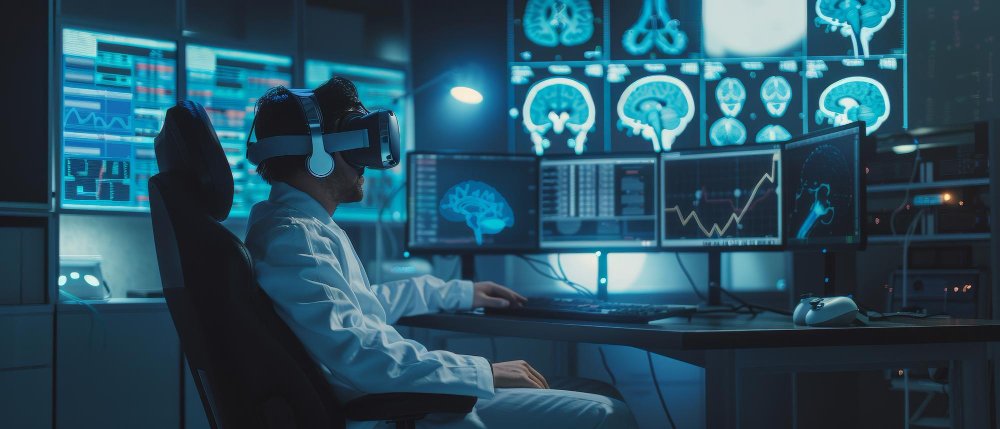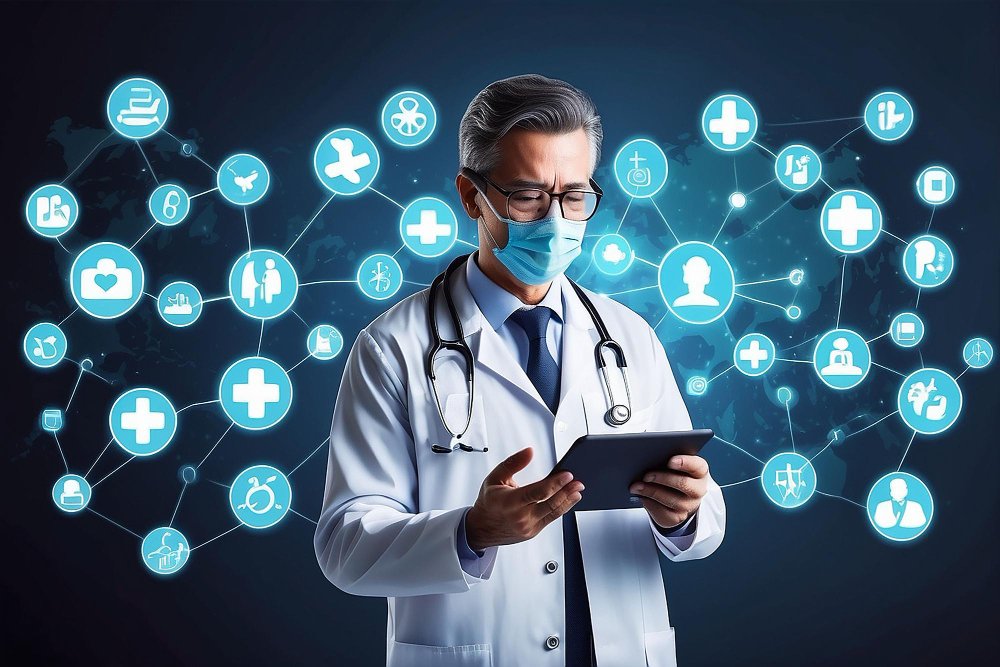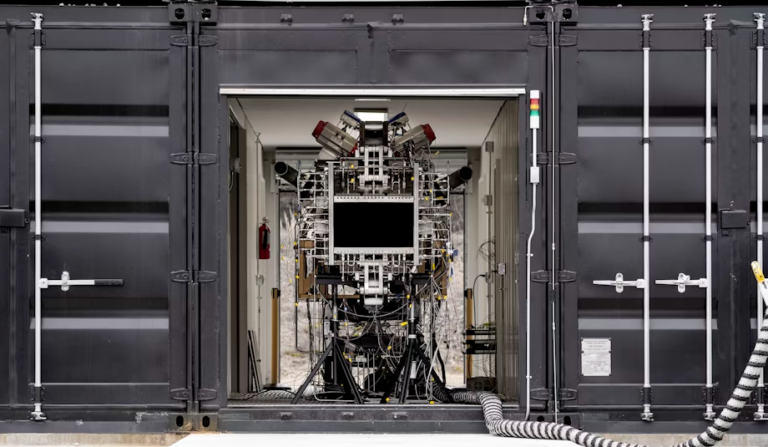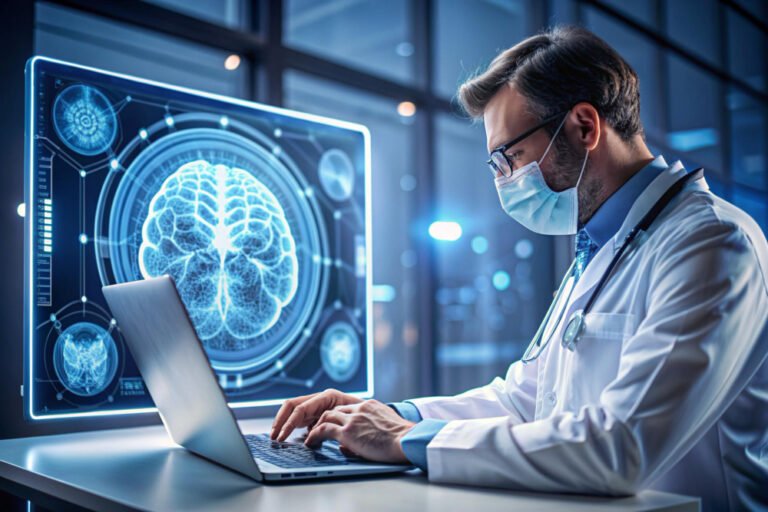The Future of Healthcare is Here: A Beginner’s Guide to AI in Medical Diagnosis and Treatment
Remember that futuristic scene from a movie where a doctor consults a machine for a diagnosis? Well, that future is no longer science fiction. Artificial intelligence (AI) is rapidly transforming the healthcare landscape, making significant inroads into medical diagnosis and treatment.
Imagine a world where your doctor is not just a highly skilled professional but also has a powerful AI assistant by their side. This AI can analyze vast amounts of medical data, identify patterns invisible to the human eye, and suggest the most effective treatment options. This isn’t science fiction; it’s the exciting reality of artificial intelligence (AI) in healthcare.
This article serves as your beginner’s guide to AI in medicine. We’ll explore how AI is revolutionizing medical diagnosis and treatment, making health care faster, more accurate, and, ultimately, more personalized for you.
What is AI (Artificial Intelligence) and How Does it Work in Healthcare?

AI refers to the field of computer science focused on creating intelligent machines that can mimic human cognitive functions. In healthcare, AI utilizes machine learning algorithms. These algorithms are essentially computer programs trained on massive datasets of medical information, including patient records, imaging scans, and scientific research.
As the AI ingests this data, it learns to identify patterns and relationships. For example, an AI program designed to detect cancer in mammograms might analyze millions of images, learning to distinguish between healthy and cancerous tissue with incredible accuracy.
There are different approaches to AI in healthcare, but here are two of the most common:
- Machine Learning: This is where the AI learns from data without explicit programming. By analyzing vast amounts of medical information, the AI identifies patterns and relationships that can be used for diagnosis, treatment planning, and even drug discovery.
- Deep Learning: This is a subfield of machine learning that uses artificial neural networks, loosely inspired by the human brain. Deep learning algorithms can process complex data like medical images and even natural language (think chatbots answering patient questions).
How Does AI Work in Medical Diagnosis?
Imagine a doctor with access to the combined knowledge of every specialist on the planet, along with the ability to analyze complex medical data in seconds. That’s essentially the power AI brings to the table. Here’s how it assists in diagnosis:
- Pattern Recognition: AI excels at identifying subtle patterns in medical images. For instance, AI algorithms can analyze mammograms to detect early signs of breast cancer with higher accuracy than traditional methods.
- Risk Prediction: AI can analyze a patient’s medical history, lifestyle factors, and genetic data to predict their risk of developing certain diseases.
- Differential Diagnosis: AI can help doctors narrow down the possibilities for a patient’s symptoms by considering a wider range of conditions and their respective likelihood.
- Improved Accuracy: AI can analyze vast amounts of medical data with a level of detail that surpasses human capabilities. This can result in earlier and more precise diagnoses, especially for complex diseases such as cancer.
- Faster Detection: AI can analyze medical scans and identify abnormalities much faster than humans. This can be crucial for diseases where early detection is critical, like some cancers.
- Reduced Errors: AI can help to reduce human error in diagnosis, which can sometimes lead to misdiagnoses.
AI in Action: Real-World Examples of Medical Diagnosis with AI
Here are some concrete examples of how AI is revolutionizing medical diagnosis:
- Skin Cancer Detection: AI algorithms are being trained to identify skin cancer with remarkable accuracy, often surpassing human dermatologists. This can lead to earlier diagnoses and improved patient outcomes.
- Diabetic Retinopathy Screening: AI can analyze retinal scans to detect diabetic retinopathy, a complication of diabetes that can lead to vision loss. Early detection allows for timely treatment and prevents vision impairment.
- Sepsis Detection: AI can analyze vital signs, lab tests, and other data to identify sepsis, a life-threatening condition. Early detection of sepsis improves the chances of successful treatment.
- Radiology: AI algorithms are being used to analyze X-rays, CT scans, MRIs, and mammograms, identifying potential abnormalities that radiologists might miss.
- Dermatology: AI can analyze images of skin lesions to detect skin cancer with a high degree of accuracy.
- Pathology: AI is being used to analyze tissue samples to help diagnose certain cancers and other diseases.
AI and Precision Medicine
AI is playing a key role in the rise of precision medicine, a personalized approach to health care that takes into account a patient’s individual genetics, environment, and lifestyle. By analyzing a patient’s unique medical data, AI can help doctors tailor treatment plans to the specific needs of each patient, which makes treatments more effective and has fewer side effects.
For instance, imagine a patient diagnosed with cancer. AI can analyze their genetic makeup to identify the specific type of cancer and recommend targeted therapies that are most likely to be effective.
How is AI Revolutionizing Medical Treatment?
AI’s impact is not only on diagnosis. It’s transforming the way treatments are planned, delivered, and monitored:
- Personalized Medicine: AI can analyze a patient’s unique genetic makeup and medical history to tailor treatment plans. This tailored approach can enhance treatment effectiveness and minimize side effects.
- Drug Discovery and Development: AI is accelerating drug discovery by analyzing vast datasets of molecular structures and identifying potential drug candidates. This can lead to faster development of new treatments for various diseases.
- Robot-Assisted Surgery: Robotic surgery systems, guided and assisted by AI algorithms, are offering greater precision and minimally invasive procedures, leading to faster recovery times for patients.
- Personalized Treatment Doses: AI can analyze patient data to determine the most effective and safe dosage of medication for each individual.
AI and Chronic Disease Management
AI is proving to be a valuable tool in the management of chronic diseases like diabetes, heart disease, and asthma. Here’s how:
- Monitoring Patient Data: AI can analyze data from wearable devices and other sources to monitor a patient’s health status in real time. This allows for early detection of potential problems and timely interventions.
- Predicting Health Risks: AI can analyze patient data to identify individuals at high risk of developing certain chronic diseases. This enables the implementation of preventive measures.
- Personalized Care Plans: AI can help develop personalized care plans for patients with chronic diseases. These plans can take into account a patient’s individual needs, preferences, and medical history.
- Virtual Assistants: AI-powered chatbots and virtual assistants can provide patients with chronic diseases with ongoing support and education.
Is AI the Future of Healthcare?
The future of health care is undeniably intertwined with AI.
- AI-powered Diagnostics at Home: Imagine a future where AI-powered diagnostic tools are available in your home. These tools could analyze your vital signs, symptoms, and even genetic data to provide you with a preliminary diagnosis or suggest when to seek medical attention.
- AI as a Surgical Partner: AI could become a surgeon’s right-hand partner in the operating room. Imagine AI systems that not only assist with robotic surgery but also anticipate a surgeon’s next move and even suggest alternative approaches during complex procedures.
- AI for Mental Health: AI is being explored for applications in mental health. For instance, AI chatbots could provide initial screenings and support for people experiencing anxiety or depression.
AI and Telemedicine: A Powerful Combination
The rise of telemedicine, where patients receive healthcare remotely through video conferencing, perfectly complements AI-powered diagnostics. AI can analyze a patient’s symptoms and medical history before the doctor-patient consultation, providing valuable insights to the doctor and allowing for a more efficient and targeted consultation.
Aiotechnical.com: A Website Focused on Health and Beauty, Digital Healthcare, and AI
While this article focuses on the use of AI in medical diagnosis and treatment, it’s important to acknowledge the broader role of technology in health care. Websites like aiotechnoical.com can be a valuable resource for those seeking information on health and beauty topics, digital healthcare solutions, and even the latest advancements in AI-powered healthcare.
It’s important to remember that information found online should never replace consulting with a qualified medical professional. However, reputable health websites can be a starting point for learning more about specific conditions or exploring new health care technologies.
Here are some additional points to consider when evaluating health information online:
- Source Credibility: Look for websites that are affiliated with reputable medical organizations or written by qualified healthcare professionals.
- Date of Publication: Ensure the information you’re reading is current, as medical knowledge and practices can evolve rapidly.
- Evidence-Based Content: Look for websites that cite credible sources to support their claims.
Ethical Considerations and Challenges of AI in Healthcare
While AI holds immense promise for the future of healthcare, there are also ethical considerations and challenges that need to be addressed. Here are some key areas of thinking and concern regarding ethics:
- Bias in AI Algorithms: AI algorithms are only as effective as the data used to train them. If the data is biased, the AI system could perpetuate those biases in its recommendations. This could lead to unequal access to healthcare or even misdiagnoses for certain demographics.
- Data Privacy: The use of AI in healthcare relies on vast amounts of patient data. It’s crucial to ensure that this data is collected, stored, and used ethically, with robust safeguards in place to protect patient privacy.
- Job Displacement: As AI automates tasks in healthcare, there’s a concern that some healthcare professionals could be displaced. However, AI is more likely to augment human capabilities than replace them entirely. The future of healthcare will likely involve a collaborative approach where AI and human professionals work together to deliver the best possible care.
- Transparency and Explainability: It’s important to understand how AI systems arrive at their conclusions. Transparency in AI development allows doctors and patients to understand the reasoning behind AI-powered recommendations.
The Human Touch Still Matters: AI as a Partner, Not a Replacement
While AI holds immense potential in healthcare, it’s crucial to remember that it’s not here to replace doctors. Doctors and other healthcare professionals bring irreplaceable qualities to the table, such as empathy, critical thinking, and the ability to build rapport with patients. AI can augment these qualities by:
- Freeing Up Time for Doctors: By handling routine tasks like analyzing medical scans and generating reports, AI can free up valuable time for doctors to focus on complex cases and spend more time with patients.
- Improving Diagnostic Accuracy: AI can act as a second pair of eyes for doctors, helping them catch subtle details in medical data that they might have missed. This can result in more accurate diagnoses and improved treatment outcomes.
- Empowering Patients: AI-powered tools can educate patients about their conditions and treatment options. This enables patients to participate in their healthcare decisions actively.
The Future of AI in Healthcare: A Glimpse into What’s to Come
The future of AI in healthcare is brimming with possibilities. Here are some exciting potential applications:
- AI-powered Drug Delivery Systems: Imagine implantable devices that can monitor a patient’s health and deliver medication precisely when needed.
- Virtual Nurses and Chatbots: AI-powered virtual nurses and chatbots can provide patients with 24/7 support, answer basic questions, and even offer emotional support.
- AI in Mental Health: AI can analyze speech patterns and facial expressions to identify signs of depression or anxiety. This can lead to earlier intervention and improved mental health outcomes.
Conclusion: Embracing the Future of Healthcare with AI
AI is not a magic bullet, but it’s a powerful tool that has the potential to revolutionize healthcare. By embracing AI responsibly and ethically, we can create a future where healthcare is more efficient, accurate, and personalized. As AI continues to evolve, one thing remains certain: the future of healthcare is looking brighter than ever.







